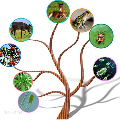Artificial agents that support people in their daily activities (e.g., virtual coaches and personal assistants) are increasingly prevalent. Since many daily activities are social in nature, support agents should understand a user's social situation to offer comprehensive support. However, there are no systematic approaches for developing support agents that are social situation aware. We identify key requirements for a support agent to be social situation aware and propose steps to realize those requirements. These steps are presented through a conceptual architecture that centers around two key ideas: (1) conceptualizing social situation awareness as an instantiation of `general' situation awareness, and (2) using situation taxonomies as the key element of such instantiation. This enables support agents to represent a user's social situation, comprehend its meaning, and assess its impact on the user's behavior. We discuss empirical results supporting that the proposed approach can be effective and illustrate how the architecture can be used in support agents through a use case.
翻译:由于许多日常活动是社会性质的,支助人员应了解用户的社会状况,以提供全面支助;然而,没有系统的办法发展了解社会状况的支助人员;我们确定支助人员了解社会状况的关键要求,并提出实现这些要求的步骤;这些步骤是通过一个概念架构提出的,该架构围绕两个关键理念:(1) 将社会状况认识概念化,即“一般”情况认识的即时化;(2) 将情况分类作为这种即时化的关键要素,使支助人员能够代表用户的社会状况,理解其含义,并评估其对用户行为的影响;我们讨论实际结果,支持拟议办法能够有效,并说明如何通过使用案例将结构用于支助人员。




